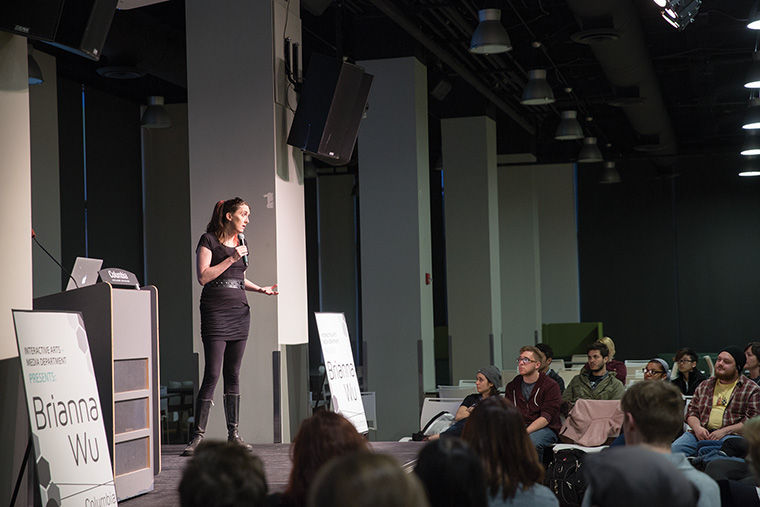GamerGate victim visits campus
Game developer Brianna Wu spoke to the college on April 8 about sexism in the gaming industry.
April 13, 2015
To most, GamerGate is a controversy that brought sexism in the video game industry to national attention. For game developer Brianna Wu, it is her life.
In an April 8 discussion titled “Choose your Character” at the Conaway Center at the 1104 S. Wabash Ave. Building, Wu, co-founder of the female-led game development company Giant SpaceKat and creator of the critically-acclaimed “Revolution 60” game, talked to students in the Interactive Arts & Media Department about GamerGate and the harassment she faced for speaking out about sexism in the industry.
Wu is a prominent victim of GamerGate, a movement led by anonymous individuals that targets women in the game journalism and game development fields, attacking them based on gender.
“At my company, we had to hire someone to catalogue my death threats,” Wu said. “Can you imagine at your job getting so many threats you have to hire someone to give them to law enforcement?”
Since she criticized sexist online movements on Twitter in late 2014, Wu said she has received more than 50 death and rape threats in addition to having her home address posted on social media. The cyber attacks were so severe that an FBI investigation ensued and an episode of “Law and Order” featured a character based on her, Wu said.
“What a lot of people don’t understand about GamerGate is this isn’t another controversy like the blue dress or the gold dress,” Wu said. “What’s really difficult about GamerGate is that we are talking about women’s lives here.”
Wu said despite feeling frightened by the threats, she feels a moral duty to stand up for fellow women in the gaming industry.
“At the end of my career, the work I’m going to be proudest of isn’t going to be any game that I shipped, it’s going to be kicking open the door for women to stay in this field,” she said. “That’s really vital, and I’m proud to be taking a stand on this.”
Wu also spoke to students about the underrepresentation of the female and other minority perspectives in the gaming industry. According to Wu, the gaming audience has grown from 11 percent female to 49 percent since 2008.
“This industry is changing—diversity is a priority now and what I think is ironic is that it got so terrible to the point where the industry cannot ignore these problems any further,” Wu said. “There are a lot of brilliant women I’ve met at [Columbia] today. I have no doubt they can go out there and change the world.”
Laura Daniels, external relations coordinator in the IAM Department, said the department has wanted to invite a speaker to campus to discuss the issue of gender equality in the gaming industry for a while. The opportunity for Wu to visit came after Colin McInerney, a senior IAM major, reached out to her via Twitter and she responded.
McInerney said equality in the gaming industry is a major problem in the field today and it needs to be addressed.
Daniels said it is important for the department’s female students to see successful women in the gaming industry because female representation is an issue in the field.
“A lot of times when people look at the game industry, they look at white males who are at the leadership [level] or even just involved,” Daniels said. “It’s important for our female students to have a role model and for our male students [to] learn what it’s like to be a female in the game industry and how to promote equality.”
Becca Hallstedt, a junior IAM major, said the gaming world needs more women like Wu in order to create products with different perspectives to foster a more intriguing experience for their audience. Hallstedt also said the IAM Department is moving in the right direction to support the future generation of the gaming industry.
“Our department is proportionally much more female than the industry is, and we are the next generation of game developers,” Hallstedt said. “That’s very exciting for me. It’s going to take time, but we have a future.”
Wu said this is the time to call on people in all facets of the gaming industry to ask themselves if they are contributing to or trying to stop the culture of sexism.
“The choice in front of us is very stark,” Wu said. “We can either put our head in the sand and keep doing what we were doing before, which is not hiring women as journalists, not hiring women to develop games and representing women in games in atrocious, objectifying ways, or we can grow in game culture and make gaming a place where everyone can play them and enjoy them. I know which side of that I want to be on, but this isn’t a choice I can make alone.”








